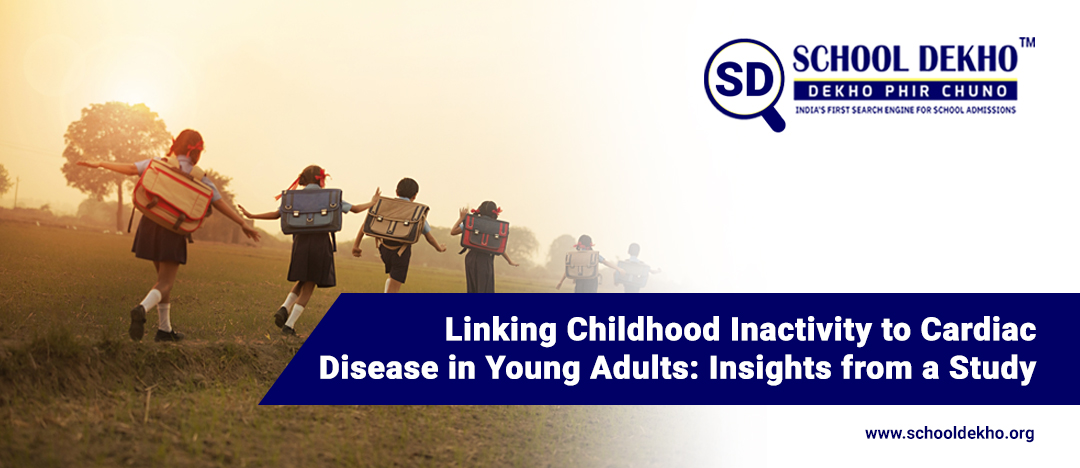
Linking Childhood Inactivity to Cardiac Disease in Young Adults: Insights from a Study
Childhood inactivity has long been a concern due to its potential impact on physical health. A recent study has shed light on a troubling association between childhood inactivity and the development of cardiac disease in young adults. This revelation underscores the critical role of physical activity during early years in preventing future health complications.
The study examined the health trajectories of individuals who experienced prolonged periods of inactivity during their childhood. It revealed a concerning trend: those who led sedentary lifestyles during their formative years were more likely to face cardiac-related health issues as young adults. This connection between childhood inactivity and cardiac disease underscores the lasting consequences of a lack of physical activity during critical developmental stages.
Cardiac disease, often associated with aging, is now emerging as a concern among younger populations. This shift has prompted researchers to explore potential risk factors that might be contributing to this alarming trend. Childhood inactivity has emerged as a significant contributor, emphasizing the importance of establishing healthy activity patterns early in life.
Physical activity is crucial for overall health, and its significance starts in childhood. Engaging in regular physical activity during early years not only fosters healthy development but also sets a foundation for lifelong habits. The study's findings indicate that the absence of physical activity during childhood can have a ripple effect on health outcomes well into adulthood.
The implications of the study are far-reaching. Childhood inactivity is not limited to short-term consequences such as obesity or weakened muscles. Rather, it can play a role in shaping an individual's health trajectory, influencing their susceptibility to cardiac disease in later years. This insight underscores the urgency of promoting active lifestyles among children and adolescents to mitigate future health risks.
The relationship between childhood inactivity and cardiac disease can be understood through multiple mechanisms. Physical activity contributes to heart health by improving cardiovascular fitness, enhancing blood circulation, and promoting healthy weight management. In contrast, a sedentary lifestyle during childhood can lead to the accumulation of risk factors that predispose individuals to cardiac complications.
Addressing this issue requires a multi-pronged approach. Educational campaigns that emphasize the importance of physical activity should be introduced in schools and communities. Parents and caregivers play a vital role in fostering active habits by encouraging outdoor play, sports, and recreational activities. Creating environments that promote physical activity, such as safe playgrounds and pedestrian-friendly neighborhoods, can also contribute to curbing childhood inactivity.
The study's findings serve as a wake-up call for policymakers, healthcare professionals, and society at large. Recognizing the long-term impact of childhood inactivity on heart health necessitates proactive measures to counter this trend. Investments in school physical education programs, after-school activities, and community recreation spaces can go a long way in encouraging physical activity during childhood.
Moreover, digital devices and screen time have become ubiquitous in modern life, contributing to sedentary behaviors among children. Balancing screen time with outdoor play and physical activities is crucial to prevent childhood inactivity. Families can establish technology-free zones and designated times for physical play to strike a healthier balance.
In conclusion, the study linking childhood inactivity to cardiac disease in young adults underscores the critical importance of physical activity during early life stages. The findings emphasize that the consequences of childhood inactivity extend beyond the immediate years, impacting health outcomes well into adulthood. Addressing this issue requires collaborative efforts from families, communities, educators, and policymakers to promote active lifestyles among children. By prioritizing physical activity during childhood, we can pave the way for healthier generations and reduce the risk of cardiac disease in young adults.
Contact with Us
Call: 1800 - 2588 - 074
Mail: info@schooldekho.org
Student’s Best Education Portal | School Dekho | India's First School Search Engine | Best Schools Near Me | Find Schools Near Me | Dekho Phir Chuno
#dekhophirchuno







Leave your thought here
Your email address will not be published. Required fields are marked *